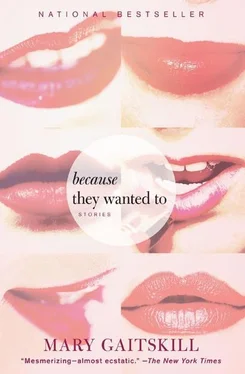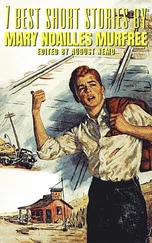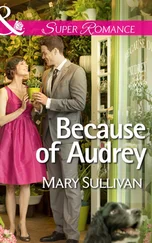We traded information and opinions as we ate. Kenneth ate with fine, tight manners. He ate as if he expected his food to be exquisite, and as if he was almost irritated to find his expectation duly met. He said he’d read my poems and thought they were good. He wondered why I didn’t write more. He described a story he had read recently and admired. It was about a man who wanted everything he did, even the smallest gestures, to be perfect. If they weren’t, he’d repeat them until they were, which meant that the author had devoted a lot of space to descriptions of such acts as the man repeatedly taking his comb out of his pocket and putting it back.
“I hate that kind of thing,” I said. “It’s an art school concept.”
“I suppose it is,” said Kenneth. “But I thought it an elegant description of compulsion.”
“Compulsion isn’t elegant,” I said. “It’s ugly as hell.”
This seemed to startle him. “Well, yes, it’s an, um, illness, I guess.” He sat poised over his plate, his utensils suspended in a slight, cute angle of ineptitude, like a pretty girl with one foot turned in. “But the story is also describing a wish for perfection that I share to some extent.” He smiled. “In a compulsive kind of way.”
“Well,” I said, “it is after all possible to be elegant and ugly at the same time.”
“I thought you’d understand.” He paused. “You know, that dress you wore at the party was a real knockout. I was hoping you’d wear something like that tonight.”
When I got home I felt agitated and vacant at the same time. I changed into my thermal pajamas and lay on the floor, eating a candy bar and lulling myself with a television fashion special that was mostly models walking back and forth while music played and high-speed graphics flared and dissolved. I went to sleep at three, and immediately had a nightmare. I was in a room full of strangers with muffled, half-frowning faces that I couldn’t quite see. I couldn’t hear most of what was said to me, nor could I make myself heard. The room was close and hot, and it was difficult to breathe. I walked around, trying to find an exit, until I realized that there was none. When I woke, I had to turn on the light and sit up, my hand on my rushing chest.
When I woke in the morning, I lay in bed for a long moment, feeling the agitation of the night, now faint and slow, with lots of empty space between pulses. I got up and made myself a mug of tea with a tablespoon of honey in it. I sat in the living room in a pool of live, swarming sunlight, drinking my tea. I thought that maybe I would write a poem about my dream. In the poem, Erin would be my companion in the dark room, a blind companion whom I could not fully see or hear but could feel in bursts of secret radiance.
Kenneth called a week after our date. He called at ten thirty at night. I ensconced myself in bed and we talked about our day. I described a class discussion of a long prose poem about a girl with “peanut-butter-colored hair” who gets gang-banged in a public pool by a band of boobs. The author of the poem, a likable young fellow, wondered guiltily whether it was wrong of him to portray the banged girl as a shallow fool. A subdiscussion had ensued about whether the character was in fact a shallow fool, just because, prior to the pool incident, she’d prattled about doing it with a local musician who later became famous. I told them it was mean-spirited and ill-advised to make a harsh judgment based on so little information, in life or in poetry—mainly because, if I were a teenage girl, I’d prattle about it too, and I wasn’t a fool, now, was I?
Kenneth, for his part, had just come from a trying dinner with his two teenage sons and one of their ridiculous friends, a dour young man with unattractive tattoos on his head, who’d gone on about how certain of his tattoos meant something sacred and private to him and then pulled up his shirt to reveal them. Kenneth thought it was stupid, but he had secretly enjoyed the fellow’s posturings, as well as those of his eldest son, John.
“John’s such a handsome kid,” said Kenneth. “He’s charming and he plays the guitar and girls just fight over him.” He sighed worriedly. “Poor Tom, on the other hand, just doesn’t have any of that. He’s smart and everything, but he’s never even had a real girlfriend, except for one back in high school, and she jumped off a fifteen-story building.”
“Well, I was kind of like that in high school,” I said.
“You jumped off a building?”
“No. People thought I didn’t have anything. Then I wrote a book of poetry that people liked. Gee, do I have something or not?”
We changed the subject. He asked me if I would like to go “on a run” with him that weekend, to scour the flea markets and antique stores for extraordinary stuff. I said no, but when he asked if I would like to have dinner with him again, I accepted.
The restaurant he chose for our second dinner was elegant and quiet. A couple in early middle age sat next to us, handling their cutlery with the careful, vaguely grateful manner of people unused to eating in restaurants. The man was like a happy animal in his suit. The woman’s hair flared up and her loud, finicky skirt flared out.
Kenneth fussed over the wine menu. His forehead sweated faintly in the light. “So,” he said, “there has been one other person I’ve been on a date with besides you—it was a year ago, when I first started the divorce. It’s a story I think would interest you.”
The woman next to us kept stiffly brushing imaginary crumbs from her skirt. She had a brittle, wounded sweetness that the man seemed very solicitous of.
“I was really anxious because I knew I didn’t want to be in the marriage anymore, but I was afraid that I couldn’t find anyone else. I looked around; there was nothing.”
“But there’s a ton of single women who want—”
“You always hear that, but really, there aren’t.” He ordered our wine. He spread his napkin in his lap and made an expansive reach for the bread. “My friends asked me, well, who did I want to meet? And I said, ‘Uma Thurman.’”
“Really.”
“And you know, like magic, that’s who I met! Well, not really Uma, but a twenty-four-year-old model who looks just like her!”
He had met this extraordinary young woman at a gallery opening. Her pale-blond hair was piled upon her head. Her loose, cream-colored pant legs wafted with her stroll. She wore white open-toed sandals, and her toenails were painted pink. She frowned at a piece of sculpture and toyed with the raised mole on the back of her perfect neck. “Oh,” said someone. “That’s Zoe. She’s either an actress who’s trying to model or the other way around.”
Kenneth secured an introduction; with a graceful grimace, she told him that, although she supported herself as a model, she wanted to be an actress, and that she was studying to be a lawyer too. He thought he felt her gently score his palm with her fingernail as she slowly withdrew her hand from his grasp.
She joined Kenneth at a small dinner party, and at the end of the evening, she allowed him to drive her home. He invited her to go out on a run with him, and she said yes.
“It wasn’t just that she was beautiful,” said Kenneth. “She’s an aristocrat—quite literally, from Poland. She speaks six languages. She can converse intelligently on virtually any subject. And she’s got flawless manners. If she needed some salt at dinner she wouldn’t just ask you to pass it. She’d say, ‘Excuse me, do you mind if I ask for the salt?’ Or if she had to go to the bathroom she’d say, ‘Please, do you mind if I use the bathroom?’ Everything was special with her. I took her to the same restaurant we went to. The waiters went crazy over her.”
Читать дальше












